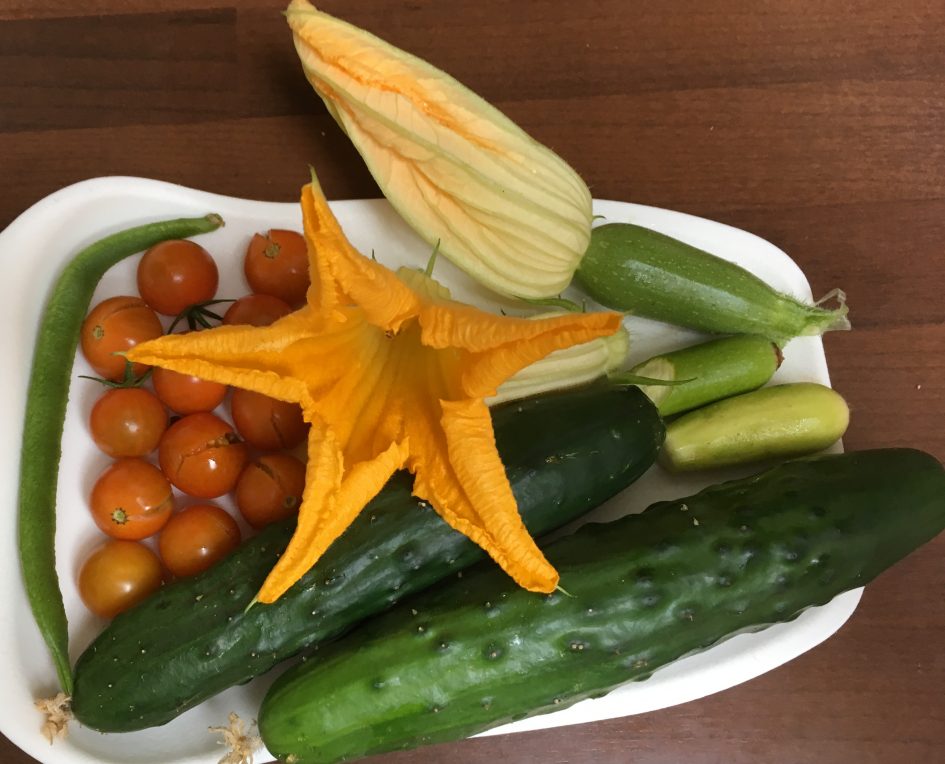I have only been growing fruit and vegetables for a few years and still think of myself as a beginner. There is always something new to learn. Although practice is the best way to learn, I found advice from other gardeners invaluable.
Here are my top tips for new gardeners starting out.

1. Grow what you like to eat
This might sound obvious but it is easy to make this mistake – if you don’t like tomatoes then there’s no point growing them!
But it’s more than that. Think of what you especially like and what you spend money on.
For example do you buy lots of strawberries in the summer? Do you eat a lot of kale? Then it is worth planting some of your own.
All fruit and vegetables taste better when they are just picked. So if you are someone who likes flavour in their food, growing your own is definitely for you.
2. Start simple and keep learning
There are plants that are particularly easy to grow, such as herbs and berries, so those can be a good place to start out.
However so many people stop there, when in reality many more plants are simple to grow. Each plant has its own wants and needs, but once you know these, growing becomes much easier.
Find out a little bit about the plant you’re growing. Do they like sunshine or shade? What type of earth do they like? Can you grow them in pots? How much space do they need? Will they need canes for support?
If you understand the basic needs of your plant you can help it to grow well.
3. Protect your seedlings
Plants, just like humans, are the most vulnerable with they are young and small.
If you are able to give a bit of extra time to your plants, try to do it while they are starting out (I recommend checking them every 1-2 days).
4. Get support from your community
Growing can be daunting at first but everyone has to start somewhere.
There’s a great deal of support and help available. From local seed swaps, to information sessions and gardening workshops.
There are many community gardens where you can join in and learn from other people who are growing.
You can go and help out and usually get some of the fresh vegetables in return, so this is a great place to gain gardening skills.
5. Growing is all about trial and error
Learning from your mistakes is the best way to do anything, and gardening is no exception. Every now and then plants will die, or won’t grow well, or won’t produce fruit or vegetables.
Although losing a whole crop can be demoralising (and it can happen overnight) there is always something to learn.
If the crop gets wiped out by slugs you need to put in slug protection. If it dries out then you need to make sure you water it, or install a watering system.
There is always a solution, and solving these problems are part of what makes gardening interesting!
What are your tips and solutions?
I’m always interested to hear ideas and solutions to try out, so please do comment on posts and let me know!

June 24, 2019 at 6:39 pm
To protect them from being dug up (during germination), you can place some long posts between the plants to make it harder for the fox/cat/squirrel.
June 24, 2019 at 6:42 pm
Thank you Eloise I am writing a post on that exact thing!
July 2, 2019 at 5:54 am
Fab advice naomi (and eloise), I really want to grow strawberries, courgettes, peas, potatoes, garlic, leeks and heirloom tomatoes – wonder if the tomatoes are too specialised though.
July 3, 2019 at 1:20 pm
Strawberries, courgettes, peas and leeks a little late now. Tomatoes maybe too late too. Be free to try but get them in quick!
You can plant potatoes and garlic for next year soon.
With the tomatoes I think it’s good to try different types as you have more chance of getting a crop – plant 1-2 of each type, that way you can try for heirloom if you want. Let me know how it goes!
I am going to do a post about what to put in now. Recommend beetroot, carrots, runner beans, lettuce, kale (if you like any of those?)